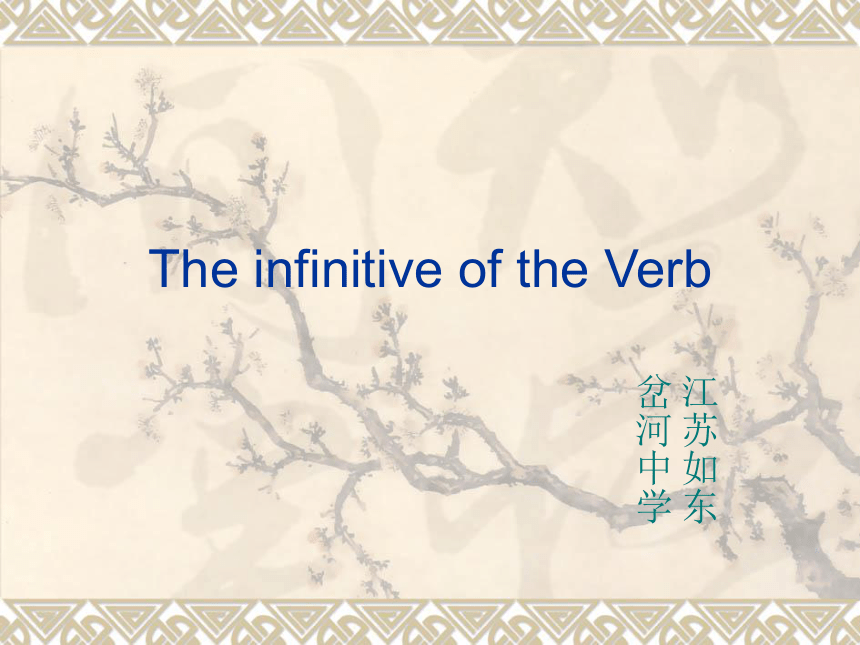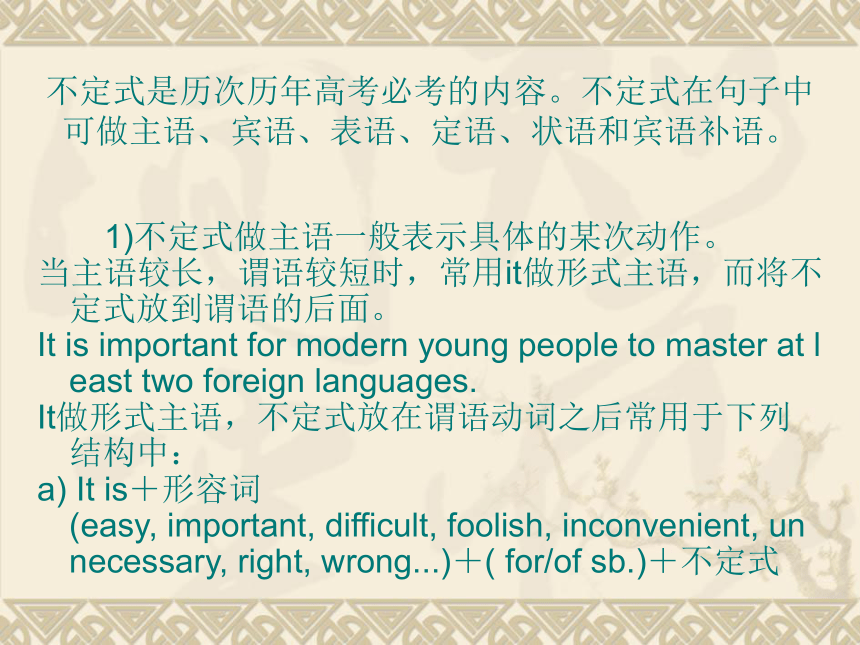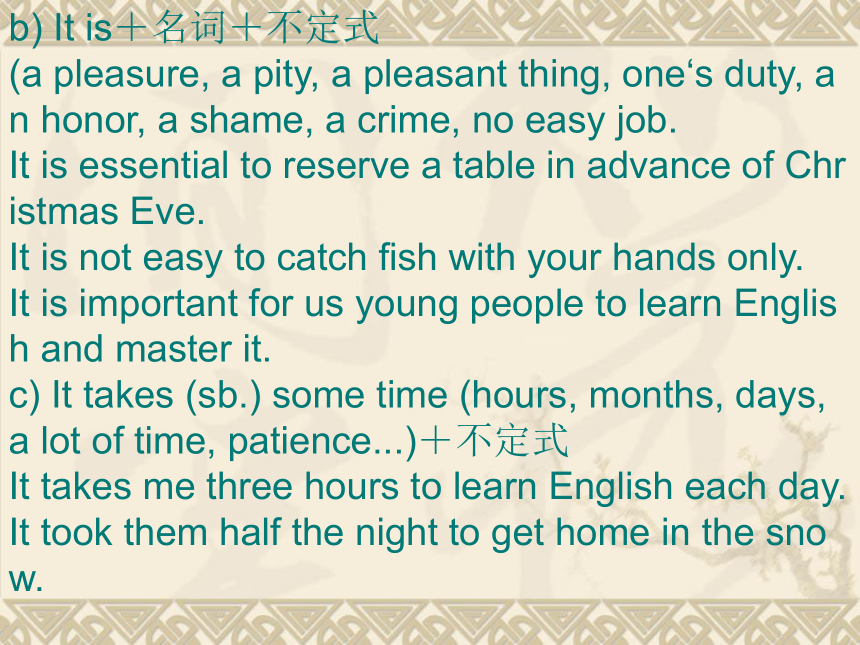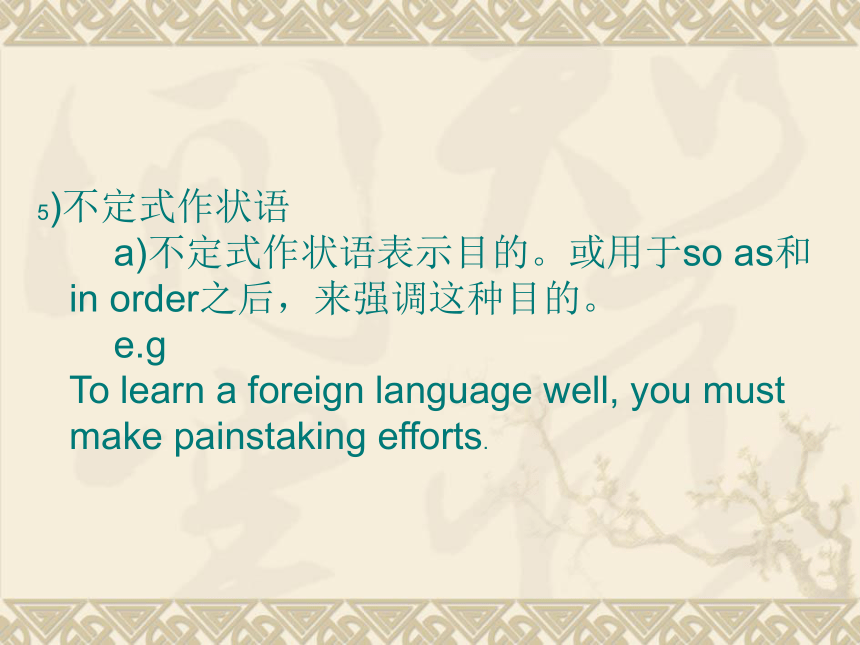牛津模块五-unit1-grammar[上学期]
文档属性
| 名称 | 牛津模块五-unit1-grammar[上学期] |

|
|
| 格式 | rar | ||
| 文件大小 | 109.7KB | ||
| 资源类型 | 教案 | ||
| 版本资源 | 牛津译林版 | ||
| 科目 | 英语 | ||
| 更新时间 | 2006-09-07 00:00:00 | ||
图片预览






文档简介
课件12张PPT。The infinitive of the Verb江苏如东岔河中学不定式是历次历年高考必考的内容。不定式在句子中可做主语、宾语、表语、定语、状语和宾语补语。
1)不定式做主语一般表示具体的某次动作。
当主语较长,谓语较短时,常用it做形式主语,而将不定式放到谓语的后面。
It?is?important?for?modern?young?people?to?master?at?least?two?foreign?languages.
It做形式主语,不定式放在谓语动词之后常用于下列结构中:
a)?It?is+形容词(easy,?important,?difficult,?foolish,?inconvenient,?unnecessary,?right,?wrong...)+(?for/of?sb.)+不定式
b)?It?is+名词+不定式(a?pleasure,?a?pity,?a?pleasant?thing,?one‘s?duty,?an?honor,?a?shame,?a?crime,?no?easy?job.
It?is?essential?to?reserve?a?table?in?advance?of?Christmas?Eve. It?is?not?easy?to?catch?fish?with?your?hands?only. It?is?important?for?us?young?people?to?learn?English?and?master?it.
c)?It?takes?(sb.)?some?time?(hours,?months,?days,?a?lot?of?time,?patience...)+不定式 It?takes?me?three?hours?to?learn?English?each?day.It?took?them?half?the?night?to?get?home?in?the?snow.
2)不定式作表语不定式作表语常表示将来的动作,主语常常是表示意向、打算、计划的词,如wish,?idea,?task,?purpose,?duty,?job等。
The?most?important?thing?for?one's?health?is?to?have?plenty?of?exercise.
My?chief?purpose?has?been?to?point?out?the?difficulties?of?the?matter.
3)不定式作宾语不定式常在下列动词后面作宾语:
afford,agree,apply,arrange,ask,attempt,beg,begin,care,choose,claim, ,demand,decide,desire,determine,expect,fail,hope,hesitate,hate,intend,learn,like,manage,mean,offer,plan,prepare?pretend,promise,refuse,,seek,tend,threaten,want等。
不定式作宾语还常用在下面结构中;主语+动词+it+形容词+不定式。 We?found?it?impossible?to?get?everything?ready?in?time.?I?think?it?important?to?learn?English?well?in?college.
使用这种句型的常见动词有:believe,?consider,?declare,?feel,?find,?guess,?imagine,?prove,?realize,?suppose,?think,等。
4)“wh?word+不定式”结构不定式前加一个疑问代词(what,?which,?who,?whom,?whose)或疑问副词(where,?when,?how,?why),以及连词whether构成特殊的不定式短语,其作用相当于一个从句,这样的不定式短语常在某些动词后面作宾语。
常见的可以接这种不定式短语的动词有:
know,?see,?decide,?tell,ask,consider,discover,explain,findout,forget,guess,hear,imagine,inquire,learn,observe,
perceive,remember,think,understand,wonder等。5)不定式作状语
a)不定式作状语表示目的。或用于so?as和in?order之后,来强调这种目的。
e.g To?learn?a?foreign?language?well,?you?must?make?painstaking?efforts.
b)不定式表示结果,特别是在so...as?to,?such...as?to,?only?to...以及too...to等结构中的不定式表示结果。 e.g I?rushed?to?the?station?as?fast?as?I?could,?only?to?find?the?train?had already?gone.
c)不定式常用来修饰形容词,构成下列词组:be?able?to,?be?afraid?to,?be?apt?to,?be?bound?to,?be?certain?to,?be?easy?to,?be?eager?to,?be?fit?to,?be?likely?to,?be?ready?to,?be?sure?to,?be?unable?to,?be?unwilling?to,?be?willing?to等。 e.g It?is?likely?to?rain?today,?for?it?is?very?cloudy. 6)不定式作宾语补语不定式常跟在下列动词之后作宾语补语:ask,?advise,?allow,?beg,?cause,?compel,?command,?enable,?encourage,?expect,?feel,?force,?find,?hear,?have,?inform,?invite,?let,?make,?mean,?notice,?order,?permit,?persuade,?remind,?require,?request,?teach,?tell,?urge,?watch,?warn,?watch等。
He?asked?you?to?call?him?at?ten?o'clock.
当不定式在 let,?make,?have,?hear,?look?at,?listen?to,?feel,?observe,?watch,?notice,?perceive(感觉到)等动词后面作宾语补语时,不定式不带to. e,g Whenever?something?is?wrong?with?you,?please?do?let?me?know.
7)不定式作主补带有宾语及宾语补足语结构的动词变为被动语态时,原来的宾语变为主语,宾补则变为主补。加主补的动词主要有:?believe,?know,?report,?say,?suppose等。
e.g.Mr.?Brown?is?said?to?have?left?for?Italy?last?week. (It?is?said?that?Mr.?Brown?left?for?Italy?last?week.) 8)不定式作定语
a)不定式作定语通常要放在其所修饰的名词或代词之后。
不定式常作下列的名词定语:attempt,?ability,?anything,?chance,?desire,?determination,?decision,?effort,?failure,?intention,?need,
?opportunity,?plan,?promise,?pressure,?right,?tendency,?time,?way等。 e.g.His?efforts?to?carry?out?the?plan?were?successful. I?have?no?intention?to?go?to?the?cinema?with?you.
b)由only,?last,?next,序数词或形容词最高级修饰的名词常用不定式作定语。 Mr.?Zhang?is?always?the?first?man?to?arrive?at?the?office?and?the?last?man?to?leave. I?don't?think?he?is?the?best?one?to?do?the?work.
9)不带to的不定式在下列词组后面的不定式不带to:would?rather?...than(宁愿……也不),?had?better...(最好),can't?help?but...(不得不),?had?
rather...(宁愿),cannot?but...(不得不,必然),may/might?as?well...(不妨),let?alone(更不用说)。 You'd?better?return?the?books?to?the?library?on?time.?Otherwise,?you?will?be?fined.Thanks for sharing it with me!
Please give me any suggestion if you do find some mistakes.-----mellissa
1)不定式做主语一般表示具体的某次动作。
当主语较长,谓语较短时,常用it做形式主语,而将不定式放到谓语的后面。
It?is?important?for?modern?young?people?to?master?at?least?two?foreign?languages.
It做形式主语,不定式放在谓语动词之后常用于下列结构中:
a)?It?is+形容词(easy,?important,?difficult,?foolish,?inconvenient,?unnecessary,?right,?wrong...)+(?for/of?sb.)+不定式
b)?It?is+名词+不定式(a?pleasure,?a?pity,?a?pleasant?thing,?one‘s?duty,?an?honor,?a?shame,?a?crime,?no?easy?job.
It?is?essential?to?reserve?a?table?in?advance?of?Christmas?Eve. It?is?not?easy?to?catch?fish?with?your?hands?only. It?is?important?for?us?young?people?to?learn?English?and?master?it.
c)?It?takes?(sb.)?some?time?(hours,?months,?days,?a?lot?of?time,?patience...)+不定式 It?takes?me?three?hours?to?learn?English?each?day.It?took?them?half?the?night?to?get?home?in?the?snow.
2)不定式作表语不定式作表语常表示将来的动作,主语常常是表示意向、打算、计划的词,如wish,?idea,?task,?purpose,?duty,?job等。
The?most?important?thing?for?one's?health?is?to?have?plenty?of?exercise.
My?chief?purpose?has?been?to?point?out?the?difficulties?of?the?matter.
3)不定式作宾语不定式常在下列动词后面作宾语:
afford,agree,apply,arrange,ask,attempt,beg,begin,care,choose,claim, ,demand,decide,desire,determine,expect,fail,hope,hesitate,hate,intend,learn,like,manage,mean,offer,plan,prepare?pretend,promise,refuse,,seek,tend,threaten,want等。
不定式作宾语还常用在下面结构中;主语+动词+it+形容词+不定式。 We?found?it?impossible?to?get?everything?ready?in?time.?I?think?it?important?to?learn?English?well?in?college.
使用这种句型的常见动词有:believe,?consider,?declare,?feel,?find,?guess,?imagine,?prove,?realize,?suppose,?think,等。
4)“wh?word+不定式”结构不定式前加一个疑问代词(what,?which,?who,?whom,?whose)或疑问副词(where,?when,?how,?why),以及连词whether构成特殊的不定式短语,其作用相当于一个从句,这样的不定式短语常在某些动词后面作宾语。
常见的可以接这种不定式短语的动词有:
know,?see,?decide,?tell,ask,consider,discover,explain,findout,forget,guess,hear,imagine,inquire,learn,observe,
perceive,remember,think,understand,wonder等。5)不定式作状语
a)不定式作状语表示目的。或用于so?as和in?order之后,来强调这种目的。
e.g To?learn?a?foreign?language?well,?you?must?make?painstaking?efforts.
b)不定式表示结果,特别是在so...as?to,?such...as?to,?only?to...以及too...to等结构中的不定式表示结果。 e.g I?rushed?to?the?station?as?fast?as?I?could,?only?to?find?the?train?had already?gone.
c)不定式常用来修饰形容词,构成下列词组:be?able?to,?be?afraid?to,?be?apt?to,?be?bound?to,?be?certain?to,?be?easy?to,?be?eager?to,?be?fit?to,?be?likely?to,?be?ready?to,?be?sure?to,?be?unable?to,?be?unwilling?to,?be?willing?to等。 e.g It?is?likely?to?rain?today,?for?it?is?very?cloudy. 6)不定式作宾语补语不定式常跟在下列动词之后作宾语补语:ask,?advise,?allow,?beg,?cause,?compel,?command,?enable,?encourage,?expect,?feel,?force,?find,?hear,?have,?inform,?invite,?let,?make,?mean,?notice,?order,?permit,?persuade,?remind,?require,?request,?teach,?tell,?urge,?watch,?warn,?watch等。
He?asked?you?to?call?him?at?ten?o'clock.
当不定式在 let,?make,?have,?hear,?look?at,?listen?to,?feel,?observe,?watch,?notice,?perceive(感觉到)等动词后面作宾语补语时,不定式不带to. e,g Whenever?something?is?wrong?with?you,?please?do?let?me?know.
7)不定式作主补带有宾语及宾语补足语结构的动词变为被动语态时,原来的宾语变为主语,宾补则变为主补。加主补的动词主要有:?believe,?know,?report,?say,?suppose等。
e.g.Mr.?Brown?is?said?to?have?left?for?Italy?last?week. (It?is?said?that?Mr.?Brown?left?for?Italy?last?week.) 8)不定式作定语
a)不定式作定语通常要放在其所修饰的名词或代词之后。
不定式常作下列的名词定语:attempt,?ability,?anything,?chance,?desire,?determination,?decision,?effort,?failure,?intention,?need,
?opportunity,?plan,?promise,?pressure,?right,?tendency,?time,?way等。 e.g.His?efforts?to?carry?out?the?plan?were?successful. I?have?no?intention?to?go?to?the?cinema?with?you.
b)由only,?last,?next,序数词或形容词最高级修饰的名词常用不定式作定语。 Mr.?Zhang?is?always?the?first?man?to?arrive?at?the?office?and?the?last?man?to?leave. I?don't?think?he?is?the?best?one?to?do?the?work.
9)不带to的不定式在下列词组后面的不定式不带to:would?rather?...than(宁愿……也不),?had?better...(最好),can't?help?but...(不得不),?had?
rather...(宁愿),cannot?but...(不得不,必然),may/might?as?well...(不妨),let?alone(更不用说)。 You'd?better?return?the?books?to?the?library?on?time.?Otherwise,?you?will?be?fined.Thanks for sharing it with me!
Please give me any suggestion if you do find some mistakes.-----mellissa
